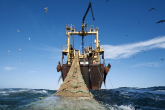Seafood processor (both shore and seagoing)
Key tasks:
• Handle processing machinery.
• Grade and pack fish.
• Clean and maintain equipment.
• Packaging and Labelling.
• Inventory Management.
Entry requirements/training:
Seafood processing includes a wide range of job types at various levels, from entry-level factory workers where no formal prior training is required (and only basic level of education) to relatively well qualified positions. All posts involve extensive in-house training and familiarisation with plant machinery, whether at sea or ashore. Factory supervisors would require some form of management training, while food quality inspectors would require experience in food production and knowledge of food laws. A SAMSA-accredited certificate is required.
Career advancement:
Entry-level workers can progress to more senior factory positions via accredited training, while food quality inspectors might consider a degree in food science and employment in other processing plants.
Associated job opportunities:
Individuals with experience as Seafood Processors may explore various associated job opportunities within and outside the traditional roles in seafood processing plants. Here are some potential career paths and associated job opportunities:
• Food Safety Specialist
• Food Quality Control Manager
• Supply Chain Coordinator
• Aquaculture Technician
• Fisheries Observer Coordinator



